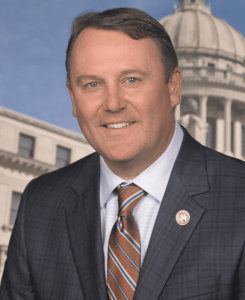Mississippi lawmakers made history in 2024 by implementing an entirely new funding formula for K-12 education, but House Speaker Jason White says the work isn’t done yet.
The Republican out of West ultimately achieved his goal of eradicating the oft-criticized Mississippi Adequate Education Program and replacing it with the Mississippi School Funding Formula — a model the speaker believes is more student-focused.

White is now looking to turn to another page of public education by pursuing legislation that would hold failing school districts accountable and move forward efforts to bring school choice to the Magnolia State. The speaker contends that the efforts will serve to appease voters’ will and wishes.
“Now we will turn our attention more to the accountability model as well as different forms of school choice for our parents. Folks say, ‘Why do the Republicans keep harping on that?’ Here’s why — because voters are demanding it,” White said on MidDays with Gerard Gibert.
“Somebody’s not sitting around the water cooler at the capitol saying, ‘What can we do next?’ They’re actually hearing from parents, taxpayers, and voters. That’s where these things come from. In spite of what anyone may think, there are no personal agendas in those areas.”
Part of White’s agenda come January is to find a way to reward successful school districts while thoroughly evaluating those that may be failing or underachieving. With the state making record investments in public education in recent years via the new formula and a historic teacher pay raise, the lawmaker is calling for more accountability to match the increased level of funding.

Though White was not specific about the measures that would be taken to bring failing districts up to speed with their thriving peers, he did not mention any monetary punishments as a means of sending a message. However, he was deadset that there would be no more excuses for chronically underperforming districts.
“If we’re going to spend plenty of money, let’s be sure we’re spending it wisely and that we’re rewarding the successful [districts] and we’re taking a closer look at the ones that are not so successful and how we can do better in those places,” White said.
On the school choice front, White vowed to advocate for students to have the chance to transfer to any other public school in Mississippi with the state’s share of money allocated for the pupil following him or her to the new district. In the scenario painted by the speaker, the district receiving the student would first consent to the move and the pupil’s parents or guardians would be tasked with covering any costs necessary for the child to attend the new school.
White contended that the proposal would ultimately aid pupils in D and F-rated school districts as they would theoretically have the opportunity to relocate to an educational center capable of providing a more robust curriculum.
“That should be a no-brainer. We call that a portability piece and we’re going to push hard for that next session,” White continued. “If you are in a D or F school district that is chronically failing and your parents, the taxpayers in almost every case, are willing to take on transporting you to some other school district, we ought to allow that. At least the state share of the per-student cost should follow that child.”
Furthering the discussion of creating new options for students in underperforming districts, White echoed sentiments espoused by Governor Tate Reeves during his State of the State address in early March. The Republican governor called for 11 additional math and engineering magnet schools to be implemented to benefit both students and the future of Mississippi’s workforce.
White plans to use this idea as an opportunity to utilize existing facilities at local universities and community colleges. Parents and guardians, particularly of students in failing districts, would have the option to send their child to a school tacked onto a college campus where the student can be educated in a new environment.
The goal is to provide pupils with a quality education and a change of scenery while simultaneously incentivizing students to pursue a degree at the respective college, providing a boost to enrollment numbers amid a dwindling student population at multiple higher learning establishments statewide.
“We’re going to create a high school in these places and that’s going to be your choice. All the money will follow that child there,” White said. “At some of those universities, with their declining enrollments, they’ve got the facilities.”
During the 2024 legislative session, House Bill 1447 was drafted to establish a rural education school program in partnership with Delta State University to serve K-12 students enrolled in failing school districts. While the bill made it out of the House with just three dissenting votes, it died in the Senate.
Nonetheless, White assured that he would revisit the concept when a new session rolls around.







